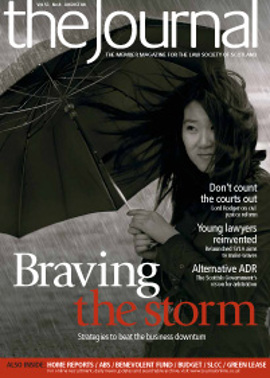Coming on the blind side
The Equality Bill and European Directive proposals have hogged the legislative limelight in recent months. Meanwhile, a “Dispute Resolution: Secondary legislation consultation” may have slipped under your radar. Uninspiring it may sound, but the paper deals with a number of potentially significant measures for employment law practitioners and clients alike, forming part of the package of measures to supplement what will become the Employment Act 2008.
Compromise agreements and HR advisers
The definition of a “relevant independent adviser”, competent to give advice and sign off on compromise agreements, is the first issue covered. Such advice is currently the domain of qualified lawyers and legal executives, along with certified trade union members and advice centre workers. The consultation suggests that it be opened up to qualified members of the Chartered Institute of Personnel and Development. These advisers – most likely acting as HR consultants – would still require to have insurance cover and be independent, i.e. not employed by the same employer. However, there is likely to be resistance to additional competition from those already able to advise.
Employment tribunal procedure
The next topic is the rate and accrual of interest on unpaid employment tribunal awards. The rate has been fixed at 8% for some time. Should this change to a floating rate reflecting the prevailing cost of borrowing? The suggestion is to set it at Bank of England base rate plus 1.5% or 2%.
Currently, only in discrimination and equal pay cases does interest accrue from the day after the employment tribunal’s decision (with an exception where the full amount is paid within 14 days). In all other cases, interest only accrues if the award remains unpaid 42 days after the decision, coinciding with the expiry of the appeal time limit. The consultation asks whether all jurisdictions should be aligned with discrimination and equal pay claims?
Proposals to allow paper-based determination of certain types of claim are then fleshed out. If implemented, claims related to unlawful deductions from wages, breach of contract, redundancy pay, holiday pay, and the minimum wage would be determined by an employment judge without a hearing. Benefits for parties are potential reduction in the time and costs associated with attendance at hearings. Militating against this is the paper’s suggestion that a hearing will “inevitably be a quicker route” than the proposed route for paper-based determinations!
Tribunal by videolink is also mooted, with draft revisions to the ET Rules stating that all parties would have to be both heard and seen should evidence be given electronically. This excludes case management discussions, so CMD by phone remains an option.
Many more potential areas of ET procedure are affected, including: augmentation of the overriding objective; express provisions re interim relief hearings; time limits and the State Immunity Act 1978; more clarity re withdrawal of claims; a reduction in the qualification period required for appointment as an employment judge; the addition of holiday pay as a jurisdiction to be heard by a judge sitting alone; and default judgments being made mandatory. Drafts of the claim and response forms to be used in the post-dispute resolution procedure world are also provided for comment.
Discrimination remedies
ETs can currently recommend that the respondent take steps to reduce the impact on the claimant of proven discrimination. However, where for example the claimant has left employment, the power to make recommendations cannot be activated. Consideration is therefore being given to broadening the tribunal’s power to made recommendations, thereby benefiting the wider workforce. Non-compliance would lead to a financial penalty, and previous recommendations could be taken into account in future proceedings. One question posed relates to how employees might be informed about recommendations made to their employer.
TUPE changes
Another question focuses on consequential amendment to the Transfer of Undertakings (Protection of Employment) Regulations 2006, asking whether references to the Dispute Resolution Regulations 2004 regarding disclosure of employee liability information, should be replaced with references to the ACAS Code of Practice on Disciplinary and Grievance Procedures?
And finally
The good news: the consultation paper reveals that the commencement date for the Employment Act 2008 – sounding the death knell for the dispute resolution procedures – is “expected to be” 6 April 2009.
Bad news: the paper points out that the transitional provisions will require the procedures to continue to apply where the act leading to a grievance took place or began prior to that date; likewise where the employer has contemplated or started disciplinary proceedings. This means cases still heading through the tribunal system in 2010 and (dare I say) beyond.
The paper asks whether consultees agree with the government’s conclusions on transitional arrangements. If not, you are asked to suggest an alternative, enabling more cases to transfer to the new regime sooner. You have until 26 September 2008 to get your thinking caps on!
Jane Fraser, Head of Employment, Pensions and Benefits, Maclay Murray & Spens LLP
In this issue
- Where have we come from, where to next?
- Shifting sands
- A rank bad rule
- Braving the storm
- Civil justice: where next?
- Title Conditions Act: new registration procedures
- Young lawyers reborn
- Shining some more light...
- Power to the tribunal?
- Piece by piece
- The poor in our midst
- The Society's future role in complaints handling
- Appreciation: Lord Johnston
- Professional Practice Committee
- Facing the lean years
- It's a web 2.0 world
- Questions, questions
- Bare necessities
- Coming on the blind side
- Relocation, relocation
- Worse than the disease?
- Sleeping bounty
- Scottish Solicitors' Discipline Tribunal
- Website reviews
- Book reviews
- Industry standard
- Meet the committee
- What's in a motto?
- Leasing by example
- Good call?
- Home reports - the practice questions






